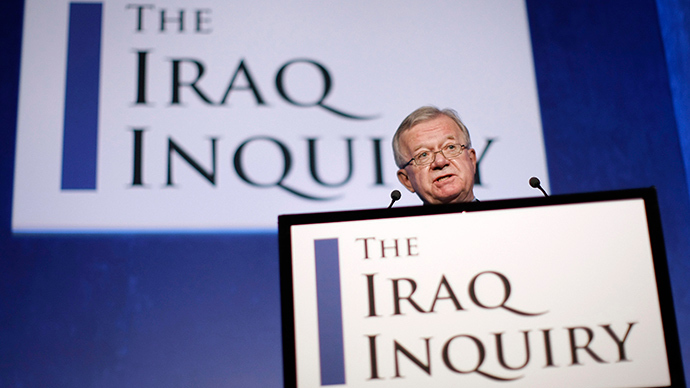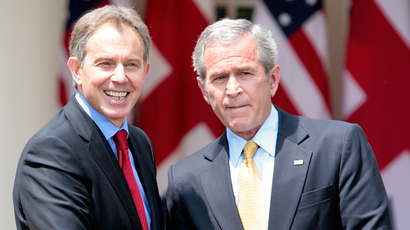‘Establishment stitch-up’: Concern mounts over Iraq war inquiry report

Ministers have come under increasing pressure to name the date when the findings of Sir John Chilcot’s inquiry into the 2003 Iraq war will be published. A debate on the cost of the probe was held in Westminster Hall on Wednesday.
Prime Minister David Cameron claimed earlier this year that the results would surface before the end of 2014. Last week, former Foreign Secretary and Commons leader William Hague said he is hopeful that Chilcot’s report will arrive ahead of the 2015 general election.
Senior Whitehall officials, however, are concerned the report could be used for political gain if published in the immediate run-up to the election.
Impatience is mounting in Westminster, with MPs demanding to know whether the inquiry’s findings will be shelved for an unacceptable period of time. Frustrations at the delay have also been expressed by the relatives of those killed and wounded in Iraq.

In Wednesday’s debate, Conservative MP Keith Simpson warned that concerns are rife surrounding the financial, political, and social costs of Chilcot’s four-year probe.
Simpson said that “costs to reputations, past and present, of Ministers, the military, the intelligence services and civil servants; [and] costs to public confidence in government, transparency and the decision to go to war” are mounting alongside the financial expense of the inquiry.
He argued that the anguish felt by relatives of “servicemen and women who were killed and wounded in the conflict” must also be considered. The Conservative MP insisted these citizens have a right to know why and how the Iraq war happened.
“A lot of expectations have built up about the inquiry’s final report. I fear that many members of the public have already made their minds up about the inquiry, and are not only allocating blame but have the fear that, somehow or other, it is an establishment stitch-up,” he said.
In 2009, then-Prime Minister Gordon Brown said the inquiry was vital to ensure that the health and integrity of British democracy is strengthened by learning essential lessons from the Iraq war.
Brown also pledged that “no British document and no British witness” would be “beyond the scope of the inquiry.”
The probe spans a period of eight years, covering the run-up to the conflict, the full war itself, and the subsequent “reconstruction” period which ensued.

MPs, campaigners, and citizens have warned the report’s findings may vindicate a brutal war that divided the nation and blackened former Prime Minister Tony Blair’s decade-long leadership.
The omission of potentially crucial Bush-Blair records raises serious questions about the “legitimacy of the investigation” and reinforces a “culture of opacity in defense and security services,” Jameela Raymond, a defense and security expert at Transparency International (TI) UK told RT earlier this year.
Read More:Iraq whitewash? Swathes of UK public inquiry findings suppressed
While withholding information from the public as a means of preserving national security may, at times, be necessary, Raymond insisted it is often merely an “excuse to hide corruption and avoid embarrassing those who do not wish their decisions to be accountable.”
Simpson acknowledged on Wednesday that there may be good reason for the delay in publishing the landmark report, but warned that neither Sir John Chilcot nor the coalition government have offered an adequate explanation.
“At the end of the day, some people are asking: to whose benefit is it that there is a delay,” he said.
Despite growing pressure on ministers to divulge why the report’s findings have been postponed so substantially, its release date remains obscured from public knowledge.














